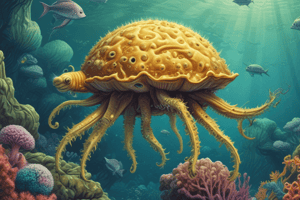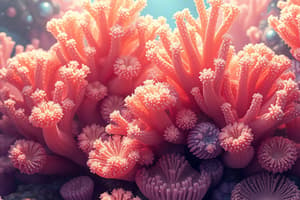Podcast
Questions and Answers
What is the primary focus of the given text?
What is the primary focus of the given text?
- The role of sea sponges in cancer research (correct)
- The geographical distribution of sea sponges worldwide
- The classification of different types of sea sponges
- The evolution of marine organisms over time
What characteristic of sea sponges makes them valuable for cancer research?
What characteristic of sea sponges makes them valuable for cancer research?
- Their long lifespan in marine environments
- Their possession of unique chemical constituents (correct)
- Their diverse and intricate biological processes
- Their ability to regenerate from small fragments
How do some compounds found in sea sponges affect cancer cells?
How do some compounds found in sea sponges affect cancer cells?
- They promote the growth and spread of cancer cells
- They have no impact on cancer cells whatsoever
- They target specific proteins or pathways involved in cancer progression (correct)
- They increase the risk of developing secondary cancers
What is the significance of understanding the interactions between sea sponge compounds and cancer cells?
What is the significance of understanding the interactions between sea sponge compounds and cancer cells?
What term is used in the text to describe the chemical compounds produced by sea sponges?
What term is used in the text to describe the chemical compounds produced by sea sponges?
Where do sea sponges typically inhabit?
Where do sea sponges typically inhabit?
Which of the following statements about halichondramide is true?
Which of the following statements about halichondramide is true?
Which of the following activities has pyridastatin NOT shown promise for?
Which of the following activities has pyridastatin NOT shown promise for?
What is the primary motivation for exploring marine species like sea sponges for new anticancer agents?
What is the primary motivation for exploring marine species like sea sponges for new anticancer agents?
According to the passage, what is a potential benefit of understanding the mechanisms of action of sea sponge-derived compounds?
According to the passage, what is a potential benefit of understanding the mechanisms of action of sea sponge-derived compounds?
Which of the following is NOT mentioned as a potential area of research related to sea sponges and cancer biology?
Which of the following is NOT mentioned as a potential area of research related to sea sponges and cancer biology?
What is the overall conclusion drawn in the passage regarding sea sponges and cancer research?
What is the overall conclusion drawn in the passage regarding sea sponges and cancer research?
Flashcards are hidden until you start studying
Study Notes
Cancer research has seen remarkable advancements over the years, driven by the need to find alternative therapies and improve treatment efficiencies. One promising area lies within marine organisms, specifically sea sponges. These simple aquatic creatures harbor diverse chemical constituents that can serve as novel sources for developing anti-cancer drugs. Here, we delve into the fascinating world of cancer research, focusing on the role of sea sponges and their significance in the fight against cancer.
Sea Sponges: A Hidden Treasure
Sea sponges, also known as porifera, are one of the simplest forms of marine life. They inhabit various ecosystems worldwide, ranging from shallow waters to abyssal depths. Although they appear shapeless and stationary, sea sponges exhibit intricate biological processes and possess unique chemical compositions that set them apart from other marine organisms.
Scientists have discovered several bioactive compounds within sea sponges that display potent anti-cancer properties. Some of these compounds target specific proteins or pathways involved in cancer progression, while others exert cytotoxic effects directly on cancer cells. By understanding these interactions, researchers can design more efficient treatments and even exploit these natural products as lead molecules for drug development.
Marine Compounds and Drug Development
Marine organisms, including sea sponges, offer considerable diversity in terms of secondary metabolites. Many of these compounds demonstrate potent biological activities, making them attractive candidates for drug discovery. However, translating these discoveries into functional anti-cancer drugs requires extensive research and optimization.
One example of a successful marine-derived compound is halichondramide, isolated from the sea sponge Halichondria spp. It exhibits potent cytotoxicity towards cancer cells, particularly those of the colon and lung varieties. Another notable compound is pyridastatin, extracted from the Caribbean sponge Cryptotheca crypta. Pyridastatin has shown promise as an anticancer agent, having been approved for analgesic, anticancer, antiviral, and antihypertriglyceridemia activities.
These drugs highlight the importance of exploring marine species for new anticancer agents. By identifying more such compounds and understanding their mechanisms of action, scientists can refine their drug discovery process and potentially develop safer, more targeted therapies.
Future Directions in Cancer Research
The integration of sea sponge research in the broader context of cancer biology holds immense potential. As our knowledge of these organisms grows, so too does the possibility for innovative breakthroughs in cancer treatment. Additionally, examining the genetic and environmental factors that influence the production of bioactive compounds in sea sponges could open new avenues for personalized medicine.
In conclusion, sea sponges represent an exciting frontier in cancer research. Their unique chemical profiles hold the key to discovering novel anti-cancer drugs and shedding light on the underlying mechanisms of cancer development. With continued investigation and collaboration between disciplines, we can unlock the full potential of these humble creatures in the quest to conquer cancer.
Studying That Suits You
Use AI to generate personalized quizzes and flashcards to suit your learning preferences.




